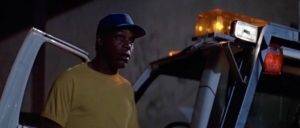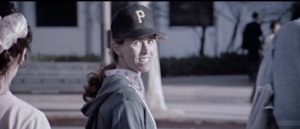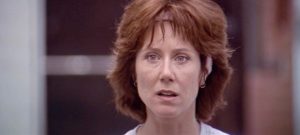Grand Canyon (1991). Directed by Lawrence Kasdan. Co-written by Meg Kasdan and Lawrence Kasdan. Starring Kevin Kline, Danny Glover, Steve Martin, Mary McDonnell, Alfre Woodard, and Mary Louise Parker. Rated R; 134 minutes.
Grand Canyon (1991) is one of those films that every clergy and parishioner, and everyone else too, for that matter, ought to “know,” meaning very well, especially in these rancorous times. It is co-written and directed by one of those faceless, but now very rich Hollywood people whose name everyone ought to know, if only to give thanks for his work. Lawrence Kasdan has written and directed such film classics as The Big Chill (1983), Silverado (1985), and, before those, Body Heat (1981). Mostly, though, the Kasdan presence is there as a writer (with others) in the Star Wars saga, specifically in The Empire Strikes Back (1980), The Return of the Jedi (1983), and most recently, in the hugely successful, The Force Awakens (2015). Kasdan’s next big thing is co-written with son Jon and George Lucas, a stand-alone Han Solo film that is now in production and due out next year. It has always been my hunch that it is Kasdan who supplies not only the words but, crucially, the aura of the numinous that runs through the best Star War films.
Whatever the delights and lessons within the Star Wars saga, and they are abundant, it is Grand Canyon that at this moment most speaks to the human condition, at least in the West and the United State in particular. It is set in a tired and badly riven Los Angeles, a condition that runs from Watts to Brentwood and everywhere in between. Mack (Kevin Kline) is a fancy immigration lawyer whose luxury car breaks down in a bad neighborhood as he tries to escape the traffic jam following the LA Lakers game he has just attended with best friend Davis (Steve Martin), a wildly successful (and narcissistic) director of grossly violent B-grade horror films. While Mack awaits a tow-truck on dark empty streets, he is accosted and threatened by a street gang of African-American youth. To Mack’s ever-lasting good fortune, just as things are getting really dicey, along comes a tow truck with driver Simon (Danny Glover), who with calm, common sense, and some courage, manages to extricate both Mack and himself from the possible predations of the gang.

It is no surprise, and a bit of a joke, that Simon shows up in the golden light of his tow-truck flasher dressed in cowboy boots. The irony here it is that a black cowboy (as were many cowboys in the old West) who rescues the white city slicker, and golly, he sure looks like some Hollywood angel.
So begins a very unlikely friendship, one that against all odds crosses all sorts of racial and class boundaries, those identities that seem to divide and define just about everything in these days of Trump, regardless of whether one likes him or not. Without saying as much, Mack considers his rescue by Simon something akin to a miracle, and it right off reminds him of other seemingly marvelous rescues in his life, such as the time on a busy street corner on LA’s Miracle Mile (hint-hint) near the Mutual Benefit building (hint-hint) a woman grabbed him by his shirt collar just as he was about to step in front of a speeding bus.

When Mack tries to thank her as she walks away, she says only “My pleasure” as Mack notices she’s wearing, in LA, a Pittsburgh Pirates baseball cap, an emblem of Mack’s favorite team with his favorite hero, Roberto Clemente, who died mid-career in a plane crash while doing international relief work.
In Grand Canyon, a host of unlikely, ever-strange connections come to pass in LA, and none more so than in the experience of Mack’s wife Claire (Mary McDonnell), who one day while jogging early in a posh Brentwood hears a cry from a brambly vacant lot. There she discovers an abandoned baby, whom she brings home and then fails to contact police or child welfare. In any case, Mack does so when he arrives after work, but Claire by then feels that she should raise this child—that the child has, in fact, been placed in her way for that very purpose. Whatever doubts she has disappear when one morning out jogging (again) a somewhat scary very tall, very hairy, and seemingly delirious homeless man mutters to her as she passes in an alley that she should “keep the baby” because “you need her as much as she needs you.” Claire whirls, her face a display of astonishment and incomprehension, a portrait of wonder in spades, which Kasdan catches in close-up. After which, the screen fades not to black but white.

Angels again, to be sure, and angels all around (for lack of a better term, and used loosely)? Especially among the least likely? Improbable, to be sure, but that is after all what the Book displays over and over, and over. And especially when it comes to what’s-his-name, the homely backwater carpenter who was himself Light.
And for what but human connection, for which we were made in the first place. The world was made to relish and venerate, and with people chief among its delights. There is the perpetual surprise of one’s own being-ness and fast upon that is the being-ness of other people, for whom we were made and they us, including, as Grand Canyon repeats over and over, the least likely, whom God seems to love especially, namely the widows, prisoners, orphans, the diseased, and the outcast. Indeed, connectedness is the best thing that happens in life.
And all is miracle, and what God most wants for this world–a redemption that brings reconciliation and friendship between aliens and enemies. This Gospel stuff is not just about saving individual souls for personal eternal bliss but situates that within a larger scheme of cosmic redemption and sanctification, to use the old lingo, wherein we all become fitting, loving members of the kingdom of God, no matter who or what. There aren’t any strangers or outcasts or enemies in God’s holy company.
written by Roy Anker
Sign Up for Our Newsletter!
Insights on preaching and sermon ideas, straight to your inbox. Delivered Weekly!
Categorized into Religion
Grand Canyon (1991) – 1